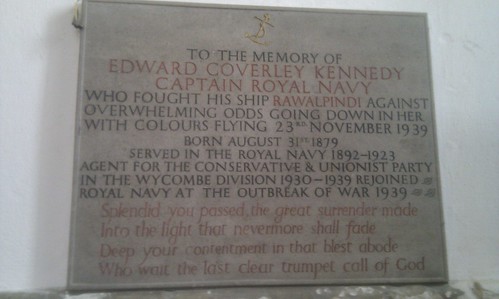
This plaque is affixed in All Saints Parish Church, High Wycombe. It is in memory of the captain of the Rawalpindi, which went down in battle in the North Atlantic on 23 November 1939. Edward Coverley Kennedy (father of the late broadcaster Ludovic Kennedy) commanded the converted liner as she encountered three German warships between Iceland and the Faroes. He managed to relay their position to Royal Navy HQ in London. The Germans ordered Captain Kennedy to surrender, as he was hopelessly outgunned. He refused to do so, and sent a shell at one of the German boats, which bounced harmlessly off its armour. The following "battle" resulted in the sinking of the Rawalpindi, and the loss of eight sailors from the Isle of Lewis. Four others were taken POW and taken to Germany.
Captain Kennedy was Mentioned in Despatches, something that is held to be underrated in view of the gallant sacrifice he, and his men, made. Even the German navy command acknowledged the bravery of the Rawalpindi, in taking on three of its most powerful warships.
The Stornoway Gazette paid tribute to the heroes of the Rawalpindi in its issue of 8 December 1939. The names of the eight sailors are:
- John Mackenzie, 21 Swordale
- Norman Macleod, 25 Swordale
- William Macleod, Marybank
- Donald Macarthur, 10 Cromore
- William Macleod, 14 Sheshader
- Colin Mackay, 31 South Bragar
- Donald Smith jnr, 52 North Tolsta
- Murdo Mackay, 53 Back
Mr A. M. Alexander, First Lord of the Admiralty, last week unveiled a memorial in High Wycombe Parish Church to the late Captain E. C. Kennedy, commander of the auxiliary cruiser "Rawalpindi" which was sunk by the German pocket battleship "Deutschland".
Captain Kennedy's crew included twelve Lewis naval reservists, of whom eight lost their lives and four were taken prisoner.
Mr Alexander said they had met to honour the memory of a very brave man. The war in which we were engaged was a struggle for freedom, freedom of action, conscience and religious liberty, and called forth more great courage and endurance than any other war in our history.
During the last 18 months, out of the sufferings and misery brought about by a lust for power, had come forth the noblest qualities of endurance, and, with the resistance of the civil population under ruthless air attack, arose a new experience the like of which they had never seen in the last war. The courage and determination of Captain Kennedy was part of the great traditions of our naval power. The action would live long in the annals of our naval history.
Mr Winston Churchill, who was First Lord of the Admiralty at the time of the engagement, took a great interest in the first great sea action of the war and asked Mr Alexander to convey his good wishes and regrets to those who mourned.
Image supplied courtesy the kind offices of All Saints Parish Church, High Wycombe
Memorial plaques are a great way to honor those who sacrifices their lives for the nation, it is always nice to see stuff like this which helps to memorize such incidents.
ReplyDelete